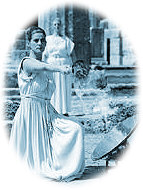|
The emergence of
city-states in the Greek world was paralleled by an expansion of organized
athletic activities. Greeks organized special festivals in order to hold
athletic events: these ranged from small-scale contests to national-wide games.
Among the latter, Olympic and Pythian festivals were in the top rank, attracting
people from almost all Greek cities. Hostilities were suspended during the
Olympic festival which added glory to the games and ensured its fame throughout
the Greek world. Every city-state was ambitious to claim as many Olympic victors
as it could and this resulted in issuing several laws to encourage athletics'.
Above all, the Olympiad was a sacred festival, and not simply a series of
athletic performances, as it is today. |
 |
|

First,
to gain victory became a major achievement that gave credits not
only to the athlete but to his city as well. Not long after Homer's times,
personal achievement could not be envisaged without the contribution and
acknowledgment of the athlete's city. Athletic victory became inextricably
linked to the victory of his city and the city became the only collective body
with rights to assign glory and awards. |

|
Second,
it was the credit to the personal achievement and the wide recognition
of the athlete's physical and moral virtues. "Kartereia", or
the degree of endurance an athlete demonstrated during the long training
period and performance became a major virtue. The athlete's ability to
suffer in silence and exhibit patience in training and practicing was
one of the most important virtues that an athlete could gain and develop
in his athletic years of life. "I won at boxing thrice by my skill
and the endurance of my hands" says an ancient boxer in his
inscription, being excessively proud of his accomplishment. Cicero notes
that often eager but not well-trained boxers could bear the blows more
than the heat at Olympia! The main concern of those competing, however,
was not to develop one specific physical ability at the expense of
others, but to succeed a balanced development of all physical and moral
values. |
|
Then, it was the moral reward that made the victory worthy of all efforts and
physical pain. The Olympic victors shared in the divine splendor and
imperishable fame of the first mythical heroes. Victory was the highest honor
for a mortal to attain, for his fame became immortal thanks to the gods who
preferred him and helped him to win. The favor of the gods and the wide
recognition the victor gained by his city was the highest prize that made the
obsessive passion of Greeks for contest ("agon") worthy of all efforts.
Lastly, it was the challenge for the Greek world to promote cooperation and
exhibit political unity. Thanks to the truce, all Greek cities could send their
official missions ("the theoriai") to attend the games. All cities
attached great importance to the sanctuary as shown in the missions they sent
and the treasuries they erected at the site. It is here that the famous Greek
philosophers, poets and historians read their works in front of the public.
These national gatherings became famous Panhellenic festivals, that promoted
cultural consciousness and strengthened Greek identity.

|